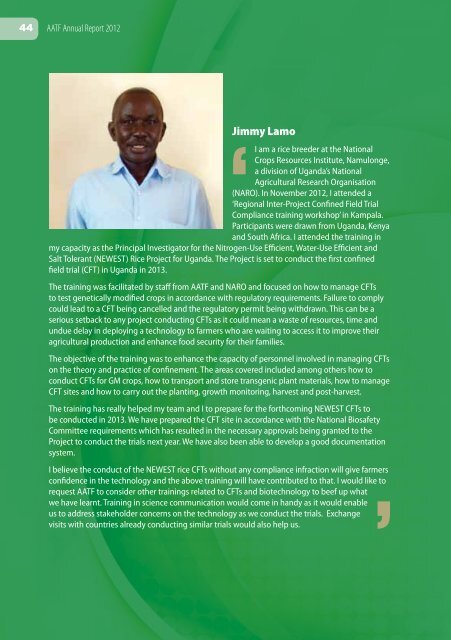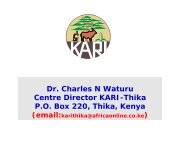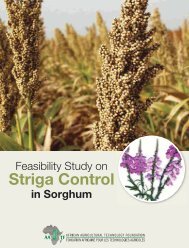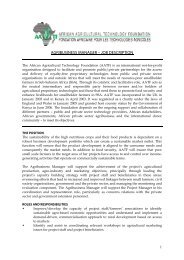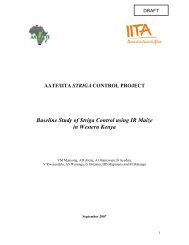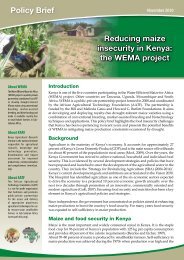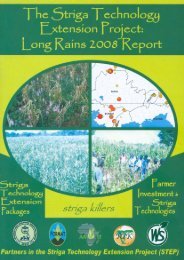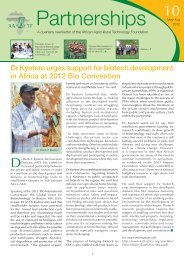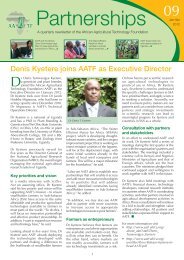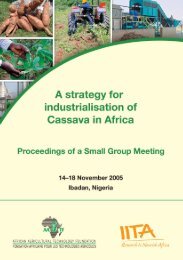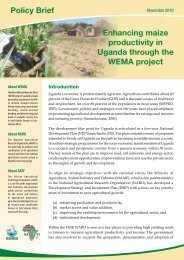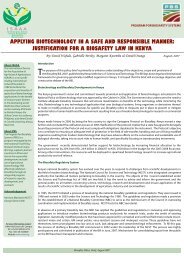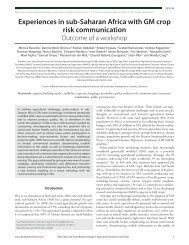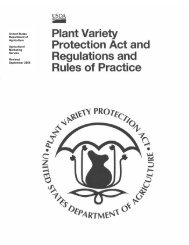Annual Report 2012 - African Agricultural Technology Foundation
Annual Report 2012 - African Agricultural Technology Foundation
Annual Report 2012 - African Agricultural Technology Foundation
You also want an ePaper? Increase the reach of your titles
YUMPU automatically turns print PDFs into web optimized ePapers that Google loves.
44 AATF <strong>Annual</strong> <strong>Report</strong> <strong>2012</strong><br />
Jimmy Lamo<br />
I am a rice breeder at the National<br />
Crops Resources Institute, Namulonge,<br />
a division of Uganda’s National<br />
<strong>Agricultural</strong> Research Organisation<br />
(NARO). In November <strong>2012</strong>, I attended a<br />
‘Regional Inter-Project Confined Field Trial<br />
Compliance training workshop’ in Kampala.<br />
Participants were drawn from Uganda, Kenya<br />
and South Africa. I attended the training in<br />
my capacity as the Principal Investigator for the Nitrogen-Use Efficient, Water-Use Efficient and<br />
Salt Tolerant (NEWEST) Rice Project for Uganda. The Project is set to conduct the first confined<br />
field trial (CFT) in Uganda in 2013.<br />
The training was facilitated by staff from AATF and NARO and focused on how to manage CFTs<br />
to test genetically modified crops in accordance with regulatory requirements. Failure to comply<br />
could lead to a CFT being cancelled and the regulatory permit being withdrawn. This can be a<br />
serious setback to any project conducting CFTs as it could mean a waste of resources, time and<br />
undue delay in deploying a technology to farmers who are waiting to access it to improve their<br />
agricultural production and enhance food security for their families.<br />
The objective of the training was to enhance the capacity of personnel involved in managing CFTs<br />
on the theory and practice of confinement. The areas covered included among others how to<br />
conduct CFTs for GM crops, how to transport and store transgenic plant materials, how to manage<br />
CFT sites and how to carry out the planting, growth monitoring, harvest and post-harvest.<br />
The training has really helped my team and I to prepare for the forthcoming NEWEST CFTs to<br />
be conducted in 2013. We have prepared the CFT site in accordance with the National Biosafety<br />
Committee requirements which has resulted in the necessary approvals being granted to the<br />
Project to conduct the trials next year. We have also been able to develop a good documentation<br />
system.<br />
I believe the conduct of the NEWEST rice CFTs without any compliance infraction will give farmers<br />
confidence in the technology and the above training will have contributed to that. I would like to<br />
request AATF to consider other trainings related to CFTs and biotechnology to beef up what<br />
we have learnt. Training in science communication would come in handy as it would enable<br />
us to address stakeholder concerns on the technology as we conduct the trials. Exchange<br />
visits with countries already conducting similar trials would also help us.<br />
Deploying agricultural technologies for farmers


